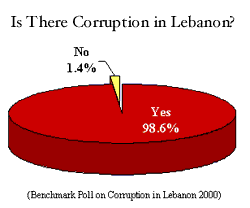 |
| Vol. 3 No. 2 | Table of Contents MEIB Main Page | February 2001 |
 |
A UN-commissioned corruption assessment report on Lebanon released last month indicates why this is so. Its findings illustrate starkly the scale of corruption in the Lebanese political system and its devastating impact on the Lebanese economy. The report, which was researched by a private company, Information International, and commissioned by the United Nations Center for International Crime Prevention, estimated that the Lebanese state squanders over $1.5 billion per year as a result of pervasive corruption at all levels of government.
This should be of no surprise to anyone familiar with the Lebanese political system. In some electoral districts, candidates for parliament must pay up to $3 million dollars to join a winning electoral slate. Once they are elected, entry into the cabinet often carries an even higher price tag. Naturally, having bought their way into the political system, most ministers have few qualms about using their positions to recoup these expenses.
Perhaps the most intriguing statistic mentioned in the UN report is the following: Only 2.4% of the $6 billion worth of projects contracted by various government bodies were formally awarded by the Administration of Tenders. The rest of these contracts were awarded not to the most qualified applicant, but to the company willing to pay the highest bribe to the minister in charge of the project. Hence, it is not surprising that the report finds that over 43% of companies in Lebanon "always or very frequently" pay bribes and another 40 percent "sometimes" do.
This corruption does not stop with the top echelon of ministers and directors of various government agencies--it is a cancer which infects the entire government hierarchy. The report mentions, for example, that 40% of households in Lebanon are not billed for electricity and don't even have meters installed. To be sure, most of them do pay for electricity--just not to the electric company. This scam is familiar to many Americans who, at one time or another, have slipped the cable man a twenty to hook up HBO for free. The difference is that in Lebanon the practice is virtually institutionalized, and it is the nation's energy supply, rather than video images, that are squandered. Another difference is that cable companies in the U.S. at least try to do something about it (e.g. the "stealing cable is a crime" commercials that appear frequently on TV). Electricite du Liban loses around $400 million each year and has yet to take action (perhaps a "stealing electricity is a crime" ad campaign might be a good place to start).
 |
| Nabih Berri |
Clientalism is the second face of corruption. Politicians in Lebanon derive what little popular support they have by distributing services and jobs to their constituents. Perhaps this is true of other countries, but nowhere is the practice more openly acknowledged and accepted as the norm than Lebanon.
Consider the case of Tele-Liban, the state-run television station which has been losing money year after year. Everyone has agreed that the station's bloated bureaucracy is the number one culprit for its dismal finances. But, rather than finding a way to objectively assess which jobs are superfluous, Lebanese politicians have been bickering over whose appointees will get the axe. The spectacle of Information Minister Ghazi Aridi and MP Omar Karami publicly arguing last month over who has the smallest "share" of employees at the station is, unfortunately, not an aberration.
Until last month, the state-funded Lebanese University (LU) had gone months without a president because Parliament Speaker Nabih Berri and other cabinet members couldn't agree on whom to appoint. In December, university faculty and students boycotted their own classes in protest. Even the acting president, Ata Jabbour, publicly declared that "the Cabinet's continuing delay in appointing a new president and council for the university is the result of a political struggle between government officials."1
Just as institutionalized greed filters throughout all levels of government, clientalism pervades throughout any institution linked to the state. The worst problem at LU is not that political clientalism influences administrative appointments, but that clientalism obstructs the university's functions even at the level of the student body. According to a first-year law student quoted in a recent news report on this topic, students cannot even register for courses at LU without permission from a member of Berri's Amal movement. "In order to get things done, you need an ally from the movement," said Wafaa, who asked that her last name not be published. "They have the final word on every issue." LU professor Antoine Messara concurred, saying that the Amal members "consider the university their own property" and that "appointments in the university, even at the highest levels, are controlled by them."2
The third face of corruption in Lebanon reinforces the other two and obstructs any significant measures to eliminate them. This third face is Syria, which occupies Lebanon with over 35,000 troops and controls the commanding heights of every major political institution in the country. Clientalism is a powerful force in Lebanese society, but it does not have the power to intimidate an entire university. Greed, on the other hand, is an evil which cannot flourish when politicians are accountable to the population. Nabih Berri is not innately more greedy than anyone else--it is the fact that he cannot be removed from office by the people he serves that causes his greed to become boundless and all-consuming.
Conclusion
Not surprisingly, Lebanese officials condemned the UN report. Even the National Integrity Steering Committee, a government-appointed body ostensibly working to stamp out corruption in Lebanon, reacted negatively. Sources close to the committee said that it was reluctant to release the report's findings to the public because it "tainted Lebanon's image."3 Fortunately, the UN had no such reservations about releasing the findings.
Fouad Saad, the minister of state for administrative development, insisted that the Lebanese people, rather than their government, are to blame for corruption in the country. Corruption is a "malignant tumor" that infects the entire population of Lebanon, said Saad. "Even if we replace all government employees, it won't solve the problem because that's how the public is." Most Lebanese strongly disagree with this statement. According to the report, over 96% believe that the "political class" in Lebanon is primarily responsible for corruption in Lebanon.
During his visit to Lebanon last month, World Bank President James Wolfensohn could only throw up his hands in despair and offer the following words of advice to Lebanon's politicians: "it's not a question of winning or losing internal battles."4 Afterwards, Lebanese officials had the audacity to accuse him of "interfering" in domestic affairs.
Meanwhile, investor confidence in Lebanon remains at rock bottom and international aid donors have politely shown Hariri the door. Even the $500 million in grants and soft loans that have already been received have not yet been spent because Lebanon's political elites have been unable to provide the sponsors with sound proposals for their allocation. Sadly, this is the result of Lebanon's version of checks and balances--powerful politicians deliberately obstruct projects that don't directly feed into their patronage networks.
Notes
1 The Daily Star (Beirut), 7 December 2000.
2 The Daily Star (Beirut), 31 January 2001.
3 The Daily Star (Beirut), 24 January 2001.
4 The Daily Star (Beirut), 1 February 2001.